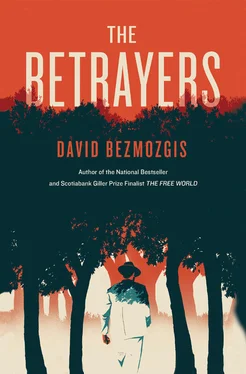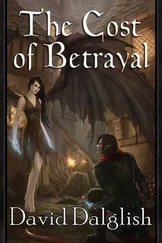— Even immoral orders?
— No, not immoral orders. But it says nothing in the Geneva Conventions about dismantling your own settlements.
— It says it in the Torah.
— I’m not so sure it says it in the Torah either. But you know I’m no Torah scholar. Anyway, that’s neither here nor there. Like it or not, our country is a democracy. The Torah is very nice, but we don’t run the country by it. If we ever did.
— Rabbi Gedalia says different.
— I’m sure he does.
— So do many other people.
— Well, if you have a majority, you can form the next government.
— So that’s it? You’re saying I should go along with this even if it makes me sick? Even if I believe with perfect faith that it is wrong, a sin against God to give up our land? You can tell me honestly that this is what you would do?
— Benzka, if you have called for my blessing, I can’t give it. I would like to give it. After what has happened and after what I have done, I want nothing more than to give you what you want. But as much as I love you, and as much as I want to please you, I can’t lie to you, my son. Because I love you, I can’t lie to you.
— You lied already.
— There are lies and there are lies.
— You say.
— This is your father, imperfect.
— So that’s all?
— You ask what I would do in your place. Let me ask you. What would happen to our army and our country if soldiers started to choose what orders they would follow? One believes evicting settlers is wrong, another believes the occupation is illegal.
— So instead we should all go against our consciences and wait until the next election? Is this what you did in the Soviet Union?
— Despite what some people say, the time has not yet come to compare Israel to the Soviet Union.
— I’m not talking about that. I’m talking about a person’s soul. When it screams, No. What are you supposed to do? Ignore it? If you see that your country is on the road to ruin, do you not do something about it? Before it’s too late.
— This is what you believe?
— It’s what you yourself said.
— As a politician, not a soldier. And not exactly for the same reasons.
— I don’t see a big difference.
— So then what can I say, Benzka? You’ll do as you see fit.
— And you won’t support me?
— If you disobey orders, no. I’m sorry.
— But I’m telling you I have no choice.
— That’s not true. If you think there’s no choice, look harder. There is always a choice. A third way, if not a fourth. Whether we have the strength to make those choices is another matter. Of which I am no less guilty than anyone else.
Leora and Svetlana looked down the corridor to where Kotler had disappeared. They kept their eyes fixed on the spot past the point of all discomfort. They were now trapped together without a word to say. Leora laced her fingers around her teacup and looked anywhere but at Svetlana. If necessary, she could sit like this for hours, for as long as it took. How many times had she sat in some government office or waiting room waging a silent war with a receptionist or rival aide? How many times during the last round of negotiations had she been sequestered with the junior members of the Palestinian delegation staring at the closed door behind which the fruitless talks were being conducted?
She had grown up waiting. She had watched her parents wait. Righteous, implacable, and unheralded. They were modest heroes, nothing like Kotler and Miriam and the others whose names had made it into the newspapers. But they had waited no less honorably. And from their example Leora had learned her first and most instructive lesson. The iron lesson: We will out-wait them. The lesson that had sustained and defined the Jews for thousands of years. It now also sustained and defined their enemies. Both parties, masters of waiting. Across the table and across the fence, waiting each other into oblivion.
Svetlana shifted in her seat and pushed back her chair. Out of the corner of her eye, Leora watched the woman until she left the room. Unwilling to turn her head, she continued to gaze at nothing and to strain her ears. She tried to decipher even a single word of Kotler’s telephone conversation but heard only Svetlana’s steps moving across the floor and receding up the hall. Then a door creaking on its hinges followed by more of Svetlana’s heavy, muffled steps. After that came finer sounds: the sliding of a wooden drawer; the snapping of a clasp; some papery rustling. Finally, the repetition of all these sounds in reverse, until Svetlana was again in the kitchen, standing before Leora with her arm extended, a fold of bills in her palm.
— It’s all here, Svetlana said. I didn’t deduct for last night.
— That’s your prerogative, Leora said. But the money is Baruch’s, not mine. You can give it to him.
— But you see the money is already in my hand. I give it to you or I give it to him, what’s the difference?
— I told you the difference. The money is his. Give it to him. It’s not for me to accept.
Svetlana looked at the money as if it were now the crux of a thorny dilemma. She resolved it by turning her palm over and laying the money on the tabletop. She resumed her seat and silence reigned between them again. Though this time Svetlana looked directly at Leora, studied her plainly and knowingly.
— I understand, I understand, Svetlana said. You dislike me. You hold an opinion of me. In your eyes, I am a certain kind of woman. A disreputable woman. Because what other kind of woman would marry a man like my husband?
— To be honest, Leora said, I haven’t given much thought to you or your character. You and your character matter very little to me. At the risk of insulting you, you and your character are at the very bottom of the list of my concerns. If that.
— Yes, and what are your concerns? Svetlana inquired, undeterred.
— Please, let’s just sit here quietly until Baruch returns. Or if you absolutely must speak, let’s talk about the weather or your recipe for borscht.
— You believe you are very different from me, but you are mistaken. I was also a young girl who fell for an older, worldly man. A man who seemed unlike other men. The others drank, strutted, talked foolishness. You knew what your life would be like if you bound yourself to them. But then a man appears who seems to be lit from within. Yes? How else to describe it? When you look at him, you see the glow. And you think that only he can rescue you from the bleak life that is inundating you like a flood.
Svetlana leaned toward Leora. Isn’t that so? she asked, to which Leora didn’t reply. What could she say to her? She detested such talk. This psychoanalyzing. The sort of idiotic conversation that passed for revelation over white wine in Tel Aviv.
— I don’t know what you think you know about our lives, Svetlana pressed on. Let me ask you, where were you born?
Leora had no wish to swap biographical data, but Svetlana waited for her answer nonetheless.
— Moscow, Leora finally said.
— And how long did you live there?
— When I was six, we left.
— Consider yourself a lucky person.
— I have no regrets. But I’ve seen places worse than Russia and Ukraine. There are even people who’ve left Israel and moved back here. I can tell you, the Ethiopians who come to Israel don’t do that.
— What do they move back here for?
— For an easier life. Why else do people move?
— Really? I’d very much like to see this easier life. I have two daughters, both educated, with no prospects. I have a son-in-law sitting idle in Simferopol. For three months he was a policeman in Yalta. In a narcotics unit. Would you like to know what that means?
Читать дальше












